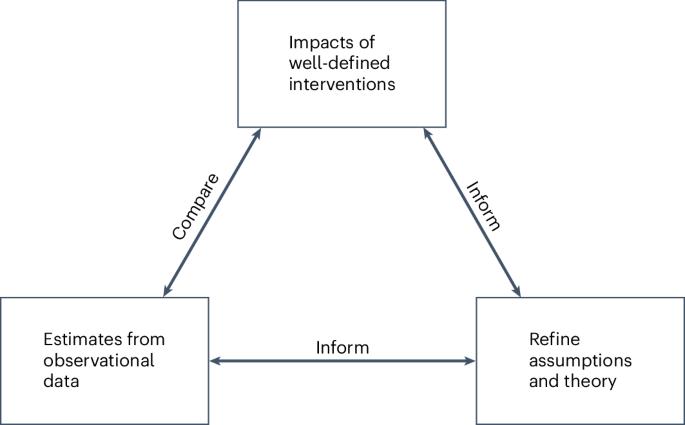Causal inference on human behaviour
IF 21.4
1区 心理学
Q1 MULTIDISCIPLINARY SCIENCES
引用次数: 0
Abstract
Making causal inferences regarding human behaviour is difficult given the complex interplay between countless contributors to behaviour, including factors in the external world and our internal states. We provide a non-technical conceptual overview of challenges and opportunities for causal inference on human behaviour. The challenges include our ambiguous causal language and thinking, statistical under- or over-control, effect heterogeneity, interference, timescales of effects and complex treatments. We explain how methods optimized for addressing one of these challenges frequently exacerbate other problems. We thus argue that clearly specified research questions are key to improving causal inference from data. We suggest a triangulation approach that compares causal estimates from (quasi-)experimental research with causal estimates generated from observational data and theoretical assumptions. This approach allows a systematic investigation of theoretical and methodological factors that might lead estimates to converge or diverge across studies. In this Review, Drew Bailey et al. present an accessible, non-technical overview of key challenges for causal inference in studies of human behaviour as well as methodological solutions to these challenges.

人类行为的因果推理
对人类行为进行因果推断非常困难,因为导致行为的无数因素之间存在复杂的相互作用,包括外部世界的因素和我们的内部状态。我们从非技术性的概念角度概述了人类行为因果推断所面临的挑战和机遇。这些挑战包括我们模棱两可的因果语言和思维、统计控制不足或控制过度、效应异质性、干扰、效应的时间尺度以及复杂的处理方法。我们解释了为应对其中一个挑战而优化的方法如何经常加剧其他问题。因此,我们认为,明确指出研究问题是改进数据因果推断的关键。我们提出了一种三角测量方法,将(准)实验研究得出的因果估计与观察数据和理论假设得出的因果估计进行比较。通过这种方法,可以系统地研究可能导致不同研究的估计值趋同或偏离的理论和方法因素。在这篇综述中,德鲁-贝利等人以通俗易懂、非技术性的方式概述了人类行为研究中因果推断所面临的主要挑战,以及应对这些挑战的方法论解决方案。
本文章由计算机程序翻译,如有差异,请以英文原文为准。
求助全文
约1分钟内获得全文
求助全文
来源期刊

Nature Human Behaviour
Psychology-Social Psychology
CiteScore
36.80
自引率
1.00%
发文量
227
期刊介绍:
Nature Human Behaviour is a journal that focuses on publishing research of outstanding significance into any aspect of human behavior.The research can cover various areas such as psychological, biological, and social bases of human behavior.It also includes the study of origins, development, and disorders related to human behavior.The primary aim of the journal is to increase the visibility of research in the field and enhance its societal reach and impact.
 求助内容:
求助内容: 应助结果提醒方式:
应助结果提醒方式:


